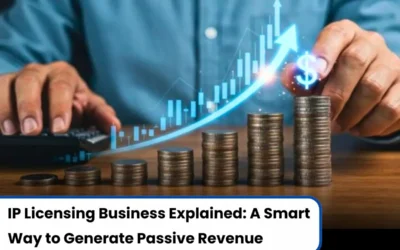
India today is buzzing with startups, investors, and big-ticket investments. But beyond the headlines of funding rounds, a quieter shift is underway—startups are increasingly turning to patent monetization for startups. This isn’t just a legal or technical step; it’s becoming a smart business move. Patent monetization has already proven valuable for businesses, investors, inventors, small enterprises, and even individuals. Yet, its impact is especially powerful for startups, because it offers a way to generate significant revenue without taking on heavy risks. The big question, though, is how patent monetization actually works, and what ways a new startup can use it to make money and strengthen its business? If you’re curious to find out, keep reading.
Why Are Indian Startups Turning Patents Into Profits Through Monetization?
To truly understand patent monetization in India, we must first look at the recent data on patent filings and other intellectual property filings in India. The numbers speak for themselves—overall, patent filings and grants have risen by an impressive 116% on average in the past few years. Even more striking is the contribution from startups and MSMEs, where patent filings alone have jumped by nearly 310%. These figures highlight not only India’s growing innovation ecosystem but also the increasing recognition of patents as valuable business assets.
But beyond the numbers lies the real story. Once a patent is secured, many patent holders don’t necessarily want to build businesses around it. Instead, they see patents as potential revenue streams in their own right. This is where patent monetization for startups comes in. In India, monetization methods include
- licensing patents,
- selling patents outright,
- litigation strategies,
- patent pools,
- partnerships, and more.
Each offers unique ways for innovators and startups to convert intellectual property into financial gains.
Read Also: Apple Patent Monetization Case Study: How IP Increases Market Dominance
What Is The Process of Patent Monetization For startups in India?
But the important question remains—how can a new startup actually carry out patent monetization in India? It’s not an easy process. It demands cost, time, networks, human resources, and consistent dedication. Even a single mistake can reduce the value of a deal, leaving the patent underutilized or completely idle. To avoid this, startups need a clear, step-by-step approach to convert patents into profitable assets.
- The journey begins with innovation and documentation, followed by patent filing and a grant to secure legal rights.
- Once patents are in hand, patent monetization for startups in India must focus on building a strong patent strategy and portfolio, ensuring that their intellectual property aligns with their long-term business model.
- The next crucial step is patent valuation—understanding and estimating the market worth of an invention. A well-assessed valuation not only guides monetization decisions but also adds credibility when showcased in pitch decks or listed on IP marketplaces to attract visibility.
- From there, startups can explore different monetization pathways. These include licensing patents to generate royalties, selling them outright for immediate revenue, pursuing litigation against infringers, joining patent pools, or entering strategic partnerships with larger companies.
- Beyond revenue, patents also serve as powerful investor magnets, boosting startup valuation and acting as a protective moat against competition.
Finally, the process doesn’t end with monetization alone. Startups must monitor the market for infringement, enforce their rights, and reinvest patent-derived revenues into R&D, creating a self-sustaining cycle of innovation, protection, and profit. Done right, patent monetization for startups can transform intellectual property from a static asset into a dynamic growth engine.
Conclusion
Patent monetization is no longer just a legal concept—it’s becoming a vital growth strategy for Indian startups. By turning intellectual property rights (IPR) into revenue, startups can not only strengthen their valuations but also attract investors and build long-term competitive advantages. With the right strategy, execution, and continuous innovation, patents can evolve from simple protections into powerful engines of profit and growth.
Read Also: USPTO Enhances Assignment Records Search: New Tool Replaces Legacy Systems by October 2025









